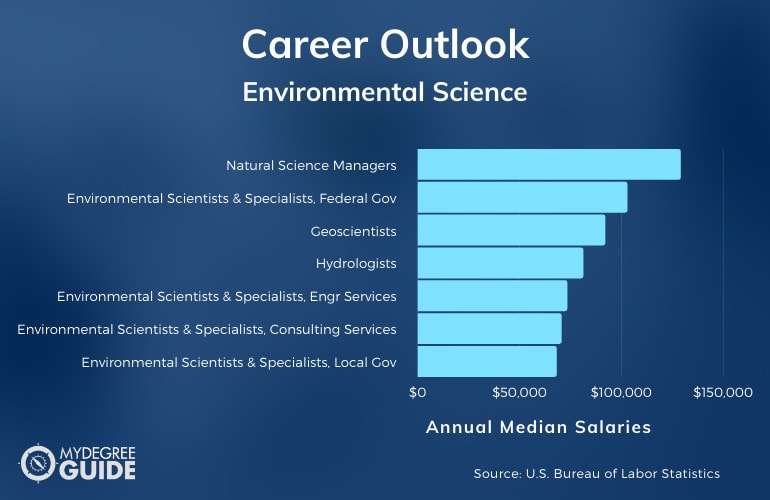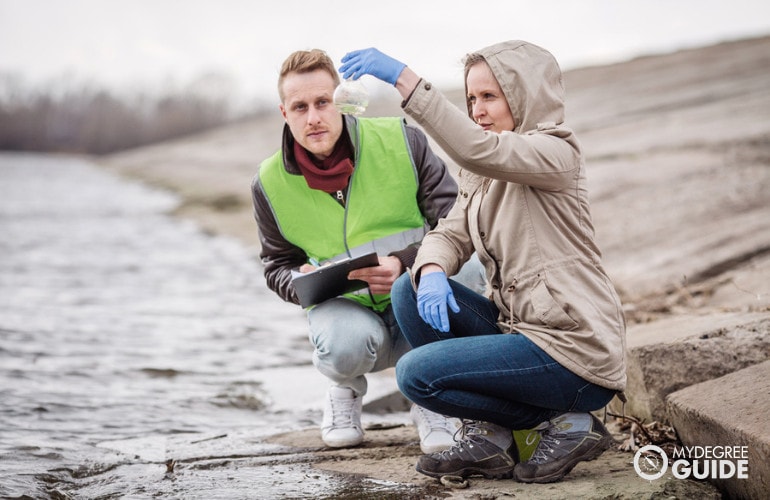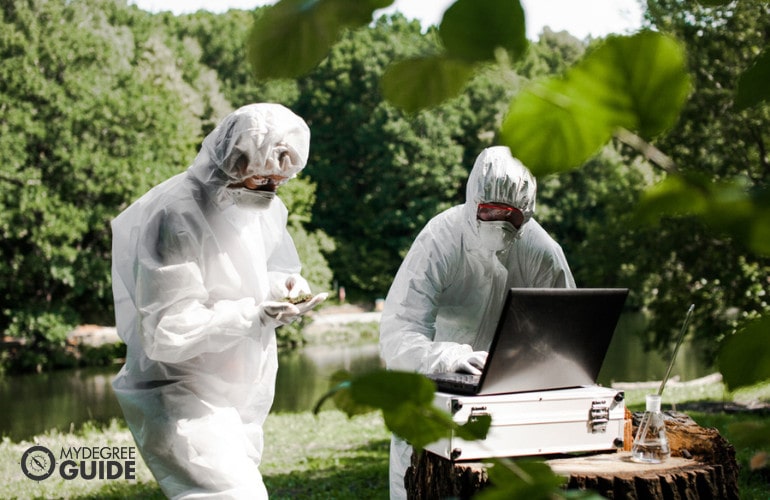If you can see yourself on the senate floor, arguing for effective conservation policy, or even out in the field, working with plants and caring for endangered animals, then an online masters in environmental science might be a good fit for you.

An MS in Environmental Science program studies multiple branches of science, such as biology, physics, chemistry, geography, and social sciences. This field of study also explores how humans impact each of these areas.
Editorial Listing ShortCode:
If you enjoy science and want to work to make the world a better place, then you may want to consider earning an online environmental science master’s degree to help you do just that.
Universities Offering Online Masters in Environmental Science Degree Programs
Methodology: The following school list is in alphabetical order. To be included, a college or university must be regionally accredited and offer degree programs online or in a hybrid format.
Johns Hopkins University
Johns Hopkins University offers an online Master of Science in Environmental Science and Policy program. Applicants must have a bachelor’s degree from a related field and a GPA of 3.0 or higher.
The program consists of 10 courses and usually takes 24 months to complete. Students are given the option to choose a specialization from five different areas, including Sustainability and Climate and Energy.
The Johns Hopkins University is accredited by the Middle States Commission on Higher Education.
Louisiana State University
Louisiana State University offers an online Master of Science in Environmental Science program. To graduate, students must complete 36 credit hours. To be eligible for the program, applicants must have a bachelor’s degree with a GPA of 3.0 or higher, GRE scores, and 3 letters of recommendation.
Louisiana State University is accredited by the Southern Association of Colleges and Schools Commission on Colleges.
Oregon State University
Oregon State University offers both a Master’s and a Professional Science Master’s in Environmental Sciences. Applicants must have a bachelor’s with a minimum GPA of 3.0 and GRE scores.
The master’s degree requires students to complete a thesis or a final project, while the professional science master’s allows students to take an internship instead. A total of 45 credits are needed to graduate from either program.
Oregon State University is accredited by the Northwest Commission on Colleges and Universities.
University of Idaho
The University of Idaho offers an online Master of Science in Environmental Science program.
Students may choose between the thesis path and the non-thesis path. Both paths require 30 credits, with up to 10 available for research purposes. Those interested in the program need a GPA of 3.0, 3 letters of recommendation, and a statement about their research and career goals.
The University of Idaho is accredited by the Northwest Commission on Colleges and Universities.
University of Illinois – Urbana Champaign
The University of Illinois—Urbana Champaign offers a Master of Science in Natural Resources and Environmental Science.
Online students are automatically put into the non-thesis program. A total of 32 credit hours, a GPA of 3.0, and a final capstone project are needed to graduate. Applicants must have a GPA of 3.0 or higher to be considered.
The University of Illinois at Urbana-Champaign is accredited by the Higher Learning Commission.
Online Masters in Environmental Science Programs

A master’s degree in environmental science studies the impact that people have on the environment.
Environmental science grad programs cover current environmental policies and how those regulations impact our environment. They also explore how potential regulations could impact the future of our world. Science influences policy, and policy influences the environment. Environmental science is a very broad field with a wide variety of specialties.
Careers related to environmental science include geoscientist, environmental scientist, climate control scientist, epidemiologist, atmospheric scientist, and environmental consultant—to name just a few!
Environmental science grad programs generally introduce you to biodiversity, conservation, law, and policy so you can discover what interests you and pursue that specialty.
If you enroll in an environmental science masters program, you’ll typically complete multiple science courses along with courses on politics, law, and the economics of environmental problems.
The first year of a program usually covers core environmental science courses, such as research methodology, conservation principals, and ecology. During your second year, you generally take specialized classes, covering anything from policy to biostatistics.
Environmental studies often include research and community collaboration projects. Plus, you may be required to complete lab work, field experience, or a thesis.
After earning their masters degree, some students find it beneficial to continue on to earn a PhD in Environmental Science.
Environmental Science Careers & Salaries

Environmental scientists can work in many different industries and specialty areas. A masters may even qualify you for positions in education or management.
The largest employers of environmental scientists are management, scientific, and technical consulting services. These industries employ 24% of all environmental scientists and specialists, and state governments employ 23% (Bureau of Labor Statistics).
According to the Bureau of Labor Statistics, there are 90,900 current jobs for environmental scientists, and job growth is at 8%, which is much faster than the national average.
| Careers | Annual Median Salaries |
| Natural Sciences Managers | $129,100 |
| Environmental Scientists and Specialists, Federal Government | $102,910 |
| Geoscientists | $92,040 |
| Hydrologists | $81,270 |
| Environmental Scientists and Specialists, Engineering Services | $73,410 |
| Environmental Scientists and Specialists, Consulting Services | $70,590 |
| Environmental Scientists and Specialists, Local Government | $68,190 |
| Environmental Scientists and Specialists, State Government | $65,180 |
| Junior College Environmental Science Teachers | $65,150 |
| Conservation Scientists and Foresters | $62,410 |
The Bureau of Labor Statistics states that the median annual wage of environmental scientists and specialists is $71,360. Most environmental scientists make between $42,810 and $124,760 each year.
There are environmental scientists who work with public health or federal, state, and local governments. Others work with scientific and technical consulting services or with engineering services.
If you are looking for a high-paying career as an environmental scientist, a position with the federal government generally pays the most, with a median salary of $102,910 (Bureau of Labor Statistics).
Natural science managers can make more than that, though, with a median salary of $129,100. A graduate degree in environmental science can help you pursue senior or management positions.
Environmental Science Master’s Curriculum

Core courses in an environmental science master’s program include courses in biology, chemistry, geology, and mathematics. Upper level courses are rich in lab work and field experience.
You may also take some of the following courses, depending on your field of study:
- Geological Foundations of Environmental Science: This course provides an overview of the earth’s materials, processes, and resources.
- Environmental Applications of Graphic Information Systems Technology: In this course, you’ll be introduced to geographical information science related to the fields of reserve planning, environmental science, natural resources, and ecology.
- Hydrology and Water Resources: This is an introduction to the hydrological cycle and the influence of climate, geology, and human activity on this cycle.
- Ocean and Atmospheric Processes: In this course, you’ll study the oceans and atmosphere as interrelated systems.
- Principals and Methods of Ecology: This course studies the relationship between organisms and their biotic and abiotic environment at three levels: the individual organism, the population, and the community.
- Environmental Policy Making and Policy Analysis: This is an introduction to US environmental policy making and analysis.
- Conservation Biology and Wildlife Management: In this course, you’ll study the meaning and implications of biodiversity as it relates to conservation biology, wildlife conservation, and wildlife management.
- Landscape Ecology: This course examines the effect of spatial patterns and scale on ecological processes.
- Maritime Law and Environment: In this course, you’ll be introduced to the process of implementing environmental policy.
- Agroecology: This is a transdisciplinary study of how agricultural production of plants and animals affects and is affected by local governments.
You have many tracks to choose from when pursuing an MS in Environmental Science. You can typically choose biogeochemistry, ecology, environmental education, natural resources, quantitative analysis, social science, water resources, or climate change.
Admissions Requirements

To be considered for enrollment into environmental science graduate programs, you typically need a Bachelor of Science in a related field.
You may also be required to submit the following along with your application:
- Additional prerequisite courses may be required
- Official transcripts
- Letters of recommendation
- Statement of purpose
Although a number of schools are becoming test optional, some programs still require GRE scores, and a management-focused program may require the GMAT. A completed environmental lab may be required for admission to some programs as well.
Accreditation

If you apply for an environmental science masters online, it is beneficial to verify that it is from a regionally accredited school. A regionally accredited university has been regularly assessed by an independent agency on the quality of education it provides.
A school’s accreditation status can impact your credits’ eligibility to transfer to another institution. Credits from a regionally accredited program are more widely accepted amongst universities. Plus, in order to be eligible for financial aid, it’s often required that your school is fully accredited.
Many employers recognize degrees from regionally accredited schools and prefer candidates with an accredited degree.
Financial Aid and Scholarships

There are many possibilities for financial aid and scholarships in environmental science. Federal student aid offers grants to graduate students who qualify. Some grants include the TEACH Grant, the Fulbright Grant, and the Iraq and Afghanistan Service Grant.
To see if you qualify, you can visit the Federal Student Aid website. Another financial aid option is state grants. Many states award grants to grad students based on their need or area of study. Professional and nonprofit organizations also offer grants and scholarships at the state, local and community levels.
Schools often provide grants or scholarships as well to students who show promise. These awards can be university wide or department specific, and they are often competitive.
Finally, if you’re currently working, you can also check with your employer. Many employers offer tuition payment programs for continued education.
What Can You Do with a Masters in Environmental Science?

An MS in Environmental Science is a generalist degree with a wide variety of specialties. Environmental scientists can work in offices, in labs, or in the field. They can protect the environment and human health by cleaning up polluted areas, advising policy makers, or working with industries to reduce waste.
Environmental scientists also work for the government to ensure that policies and regulations are followed. They can also collect and analyze data to prevent, control, or fix environmental problems.
Graduates with a masters in environmental science may also pursue careers as hydrologists, geoscientists, natural science managers, and junior college teachers.
How Long Does It Take to Get a Masters in Environmental Science Online?

Most graduate programs take 1 year or 2 years to complete. You can generally earn an MS in Environmental Science in 2 years if you follow a traditional, 16 week semester and attend full-time.
Some online programs offer an accelerated degree. With this option, you may be able to finish in less time if you follow an 8 week semester and attend year-round. Working a part-time or full-time job while enrolled may impact how long it takes you to finish your degree, depending on how many courses you are able to take each term.
Is a Masters in Environmental Science Worth It?
Yes, a masters in environmental science is worth it for many students. Environmental science programs encompass multiple branches of science, allowing you to study the environment with a more integrated approach.
You can also learn a variety of transferable skills that are needed in the job market. A masters in environmental science is often considered a more practical science degree because of its usefulness in the real world.
Environmental science is experiencing faster than average job growth as global warming, air pollution, and plastic waste continue to be hot topics.
Getting Your Masters in Environmental Science Online

Depending on your specialty, a masters in environmental science online program can help prepare you to work in a variety of industries and settings, such as the following:
- Geology
- Water management
- Environmental engineering
- Sustainable energy
- Energy management
- Government policy
- Environmental policy
- Environmental technology
- Climate change
A masters in environmental science can help give you a competitive edge in the job market and even help qualify you to pursue leadership or management roles. Online programs often offer ultimate flexibility, allowing you to learn according to your own schedule.
If you’re ready to advance your career in this rewarding field, you can start by exploring online environmental science degree programs from accredited universities.
